|
|
|
Page No - 1
|
|
Goto Page No. 1 2
3 4
|
|
|
MSSO NEWS - 2000
|
|
|
|
Editor: Eilish Hiebert
|
|
|
|
|
|
|
|
Since the publication of the last newsletter, Maharashtra Seva Samiti Organization (MSSO)
sponsored 6 new projects. Based on the amounts of funding commitment, three of these may be classified as major
projects. Their funding ranges from $84,000 to $293,000. These three projects received matching funds both from
the Wild Rose Foundation (WRF) and the Canadian International Development Agency (CIDA). For administrative purposes,
the other three projects, with funding ranging from $7,000 to $12,000, have been jointly sponsored by the Vedanta
Society of Calgary. These latter projects received matching funds only from the Wild Rose Foundation.
|
|

|
|
Literacy & Development of Tribals
(Funding of $293,366 over three years)
|
|
Maharogi Sewa Samiti, Warora (MSSW), founded by Baba Amte in 1951 for treatment,
training and rehabilitation of leprosy patients, later expanded its activities to include physically handicapped,
orphans, seniors, tribal and many other less privileged sections of the society. MSSO is supporting only one of
these activities, Lok Biradari Prakalpa (Peoples' Brotherhood Project). The project is meant for the development
of the tribals from Hemalkasa, Bhamragarh, Bastar and other surrounding regions of Gadchiroli district. With the
centre located in Hemalkasa, it provides a hospital facility, a residence school, vocational training centre, wild
animal orphanage, agricultural services and awareness program. Additional details of the Lok Biradari Prakalpa
may be found at www.locateindia.com/lbp.
|
|

|
|
|
|
MSSO gratefully acknowledges
assistance of the following in the production of MSSO News
|
|

|
|
CANADIAN INTERNATIONAL DEVELOPMENT
AGENCY
200 Promenade du Portage, Hull, Que., Canada K1A 0G4
|
|

|
|
POLYPHASE ENGINEERED CONTROLS
LTD.
3555 - 93 Street, Edmonton, AB, Canada T6E 6N6
|
|

|
|
RICHMOND PRINTING & SPECIALTIES
INC.
#10, 3803 - 26 Avenue SW, Calgary, AB, Canada T3E 6V7
|
|
|
|
|
|
Two boys from the first batch of the students educated in the school run by MSSW have
become doctors. They are about to finish their postgraduate training. Both intend to return to Hemalkasa and join
the team of volunteers serving the target area. This is a notable achievement. Several other boys educated at the
centre have become teachers and returned to their respective rural villages as teachers. An immediate need of the
MSSW is to provide residence facilities for these past students who are sacrificing a lucrative medical practice
in order to return to serve their own.
|
|

|
|
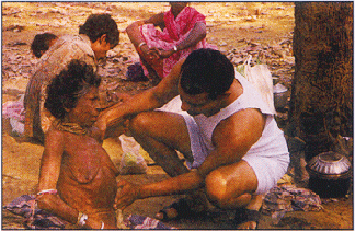
|
|
Tribals prefer outdoor rather than indoor hospital treatment
|
|

|
|
Similar noteworthy development has not been possible in the case of girls. Though education
is equally available to both boys and girls, significantly lower proportion of girls make use of the educational
opportunities. This condition is reflected in the numbers of boys and girls taking advantage of the school run
by MSSW. Among 575 students, only 111 are girls. Added to this, the dropout rate of girls at the primary level
is significantly higher than that for the boys. Educating girls is often perceived as a liability as girls leave
home after marriage. One of the reasons behind the lower number of girls is lack of proper residence facilities.
Currently girls are housed in staff quarters and in a warehouse.
|
|
|
|
|
|
|
|
|
Page No - 2
|
|
Goto Page No. 1 2
3 4
|
|
|

|
|
|
|
|
MSSW has only 10 classrooms. Based on the government rule of 40 students per class,
MSSW receives operating expenses from the State Government only for 400 students. Any students in excess of 40
in a classroom do not receive operating funds from the government. To obtain funding for the remaining 175 students,
MSSW needs to construct additional 5 classrooms and provide interim assistance for operating expenses incurred
for these 175 students till government assistance is approved.
|
|

|
|
Forest Management and Environment
(Funding of $84,445 over three years)
|
|
Samaj Parivartana Samudaya (SPS) (Association for Social Transformation) was
formed to create social awakening to prevent pollution of rivers, to conserve forests and to stop exploitation
of tribal people whose livelihood depends on forests. SPS motivates people to participate in the management of
natural resources. The efforts of SPS have influenced the National Forest Policy of the Indian Government. Recognizing
their contribution to environmental awareness, the Ministry of Environment and Forest, Government of India, awarded
SPS the prestigious Indira Gandhi Paryavaran Puraskar (Indira Gandhi Environment Award) for the year 1989. The
World Watch Institute, Washington DC, also took note of the work of SPS in their annual report: State of the
World - 1989.
|
|

|
|
The MSSO project assistance will support the forest dependent people in 18 villages of Karnataka by making them
aware of their rights to the use of common lands and forests. SPS will intervene on their behalf if necessary to
protect these lands from the vested industrial and commercial interests and educate them on the use of these lands
without destroying the environmental balance.
|
|

|
|
|
The project activities will:
|
|

|
empower forest dependent people through information,
|
|
|
mass movements and interventions, using judicial process if necessary;
|
|

|
restore their rights over common properties like forests,
|
|
|
rivers and lakes in situations where the laws of the country are flouted by industry
and/or commercial interests;
|
|

|
instill in in  them them
 the the  determination determination  to to preserve preserve  forests forests
|
|
|
through education and demonstration of possible devastating alternatives to protection.
|
|
|

|
|
The result expected by the end of the project is a sustainable development and preservation of forests wherein
the forest dependent people will participate in Joint Forest Management program of the Government of India and
contribute to growth of forests. In the process they will also learn to maintain environmental balance and obtain
forest produce needed for their day-to-day livelihood.
With MSSO help, SPS will establish a resource centre, which will contain audio video materials, photos, newspaper
clippings, books, baseline surveys, documents related to various camps, workshops, satyagrahas and jathas. Equipped
with these materials, the centre will be able to meet the increasing needs for information by villagers, volunteers,
other NGOs, students of environment, social activists and SPS staff.
|
|
|
|
The project will be self-supporting after a period of three years. During this period
participants will receive help from SPS to organize their own self-help groups. As a result, they will be more
self confident and assertive in playing their important legitimate role in the protection of natural resources.
|
|

|
|
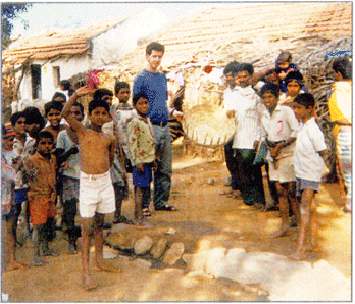
Quinn Hiebert showing off a basket presented to him
by SPS Project Beneficiaries
|
|

|
|
Rehabilitation of Hearing Impaired
(Funding of $247,502 over three years)
|
|
K.S. Wani Memorial Trust and The Institute for Rehabilitation of Handicapped
in Hearing are working together to address the issues facing the hearing impaired in Dhule and Nandurbar districts
of Maharashtra. Approximately 1 in 1000 Indians are estimated to be hearing impaired. A special needs school for
hearing impaired children is currently run in rented premises designed for residential use. Due to lack of facilities
in their own town, many children have to travel more than 30 kilometers every day by inter-city bus service to
attend the school. Due to impaired hearing, they are exposed to high risk during the travel. (One such student
lost his life in a road accident.) In some cases the mothers forgo employment opportunities so that they can commute
with their children to school to reduce the risks during travel. Many parents in rural areas simply do not send
their hearing impaired children to the school because of the risk during travel. These children lose self- respect
and remain unproductive members of the family. A residence school facility will benefit these rural families and
relieve the mothers to take on a productive employment.
|
|

|
|
Since the school operates out of rented premises, originally designed for family use,
it lacks the necessary classroom facilities for impaired hearing students. The school has been forced to change
premises from time to time to suit the convenience of the private owners. The school is overcrowded, due to shortage
of space and staff. The school has 75 students but receives government funding only for 60 students. If provided
with adequate facilities, they can admit additional 25 students.
|
|

|
|
MSSO assistance will provide a permanent school building for 100 students and a residential
facility for 50 children, currently commuting daily from surrounding rural areas.
|
|
|
|
|
|
|
|
|
Page No - 3
|
|
Goto Page No. 1 2
3 4
|
|
|

|
|
|
|
|
For instructional purposes, 6 special needs teachers and assistants will be hired. Additional
11 employees will be hired for administration, housekeeping and safety. After the initial start-up costs are provided
through the proposed initial funding, additional students will receive operating grants from the Government of
Maharashtra.
|
|

|
|
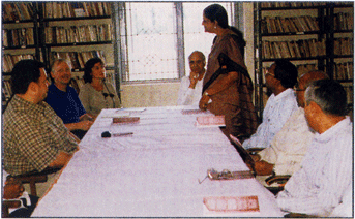
|
|
Professor Shobha Shinde, Secretary of
K.S. Wani Memorial Trust, presenting the case of
hearing impaired to the CIDA assessment team
|
|

|
|
Sheltered Workshop for Mentally Challenged
(Funding of $12,000 over three years)
|
|
The Late Ratibai Maganlal Jain Public Trust runs a school for mentally challenged children.
Since the opening of the school, more than 100 students have completed their schooling. Several former students
who have crossed the age of 18 years cannot continue in the school. Social and economic conditions force the parents
of these mentally challenged persons to consider their children a burden. The trust intends to start a sheltered
work centre for these students. The project will provide them training in bookbinding, production of exercise books,
files, hangers, `bindi' (a cosmetic decoration which a hindu female puts on her forehead) as well as papada (a
thin taco style food item). Through such income-generation training and activities, the mentally challenged persons
will gain confidence and become economically self-sufficient. The centre will accommodate 10 girls and 15 boys.
For instructional purposes, 3 special needs teachers and assistants will be hired. Additional 2 employees will
be hired for administration, housekeeping and safety.
|
|

|
|
Premarriage Education and Awareness
(Funding of $10,000 over two years)
|
|
Susamvad (Friendly Dialogue) chose to focus its
activities on the "family" as the smallest unit of democracy in the society. Family can be the root of
domestic violence, abuse, delinquency, destitution and exploitation, which affects the society. Counseling prior
to marriage is a preventive measure to reduce these problems and marriage break-ups. This is also a preventive
measure to reduce the number of deserted destitute women seeking help from shelter homes.
The present project will provide premarriage education to those on threshold of marriage. The education process
will develop and promote holistic understanding about the concept of marriage, based on gender-just and democratic
principles, among young men and women who are contemplatin .marriage. .This. will. be. a.
stepping-stone .to
|
|
|
|
a happy and fulfilling marriage.
Quite often marriages take place on emotional grounds, without any thought to the necessary adjustments and accommodations
required for a successful marriage. Understanding roles and responsibilities takes a back seat. This leads to marriage
break-ups resulting in problems leading to deserted women.
For registered marriages, there is a one month waiting period after the notification with the registrar of marriages.
This waiting period can be used effectively through the medium of this project to make the prospective couple understand
roles and responsibilities.
Various groups from Pune city and district that will benefit from the project include (1) college and university
going youth, (2) industry workers, (3) youth - from institutions such as orphanages - with no experience of family
life, (4) youth registering with marriage bureau, and (5) youth registering proposed marriage with the registrar
of marriages.
|
|

|
|
Empowering Rural Women
(Funding of $7,000 over two years)
|
|
Appa Patwardhan, a close disciple of Mahatma Gandhi, established Mahatma Gandhi Lokseva
Sangh (MGLS) on 2 October 1979. MGLS runs several activities for the benefit of the rural population. Due to lack
of job opportunities in Kokan men folk have been migrating to big cities like Mumbai, Pune and Kolhapur. Women,
children and seniors are left behind. Women find it difficult to maintain the family. MGLS plans to provide training
to these women in the following areas: (1) raising and maintaining horticulture plants such as mango, cashewnut,
kokum and Jack-fruit, (2) kitchen garden, (3) composting of green leaves and kitchen waste, (4) awareness about
women's right and government schemes for earning opportunities.
|
|

|
|
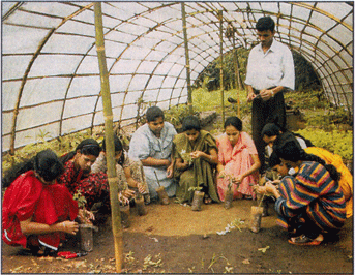
Trainees acquiring grafting techniques
|
|

|
|
Schizophrenia - Awareness Issues
|
|
Notwithstanding the rapid progress in social, economic, and scientific contexts, the
stigma associated with mental illness has not shown a substantial decrement even in urban, upwardly mobile Indian
families. Rough estimates put the lifetime incidence rate of Schizophrenia at around 1% of the total the total  population. People population. People  turn to turn to  mental mental health health
|
|
|
|
|
|
|
|
|
Page No - 4
|
|
Goto Page No. 1 2
3 4
|
|
|

|
|
|
|
|
facilities only for treatment of acute or chronic psychiatric problems. These facilities
are guided by a medical-clinical model. They neither have resources nor manpower to deal with awareness, stigma
reduction and reintegration issues. This picture has prompted MSSO to help the Pune based Schizophrenia Awareness
Association (SAA), which is striving for a substantial increase in awareness about schizophrenia and a better acceptance
and understanding by families and caregivers.
|
|

|
|
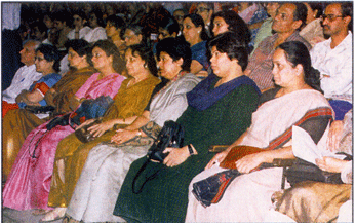
|
|
Standing Room Only Crowd Listening Intently to a Speaker at an Awareness
Meeting Organized by SAA
|
|

|
|
An average Indian suffering from any psychological problem is neglected by the family
who tries to hide the problem because of the stigma attached to mental health problems. The families who are more
open about accepting the reality do not have outlets to turn to for help. A vast majority of afflicted are left
without any help. Possible reasons, among others, are: (1) lack of awareness that they are suffering from a psychiatric
disorder which can be treated; (2) the stigma associated with mental illnesses; (3) the lack of quality care available
at financially viable rates; (4) frustration with the available services and (5) simple confusion and not knowing
where to go for help. Creating awareness and reintegration of those suffering from the mental health disorder is
a specific need for males, and more so for females. Prevailing social and cultural circumstances are more devastating
for female victims. These circumstances leave them unaware, distressed and debilitated if suffering from a mental
illness.
|
|

|
|
|
|
|
21 Million Canadians Contribute to Charities Canadians' generosity resulted in
direct financial support to charities and non-profit organizations totalling an estimated $4.51 billion during
the taxation year 1996-97. Compassion for others, strong belief, or a direct experience with the cause prompt Canadians
to put their money where their hearts are. Approximately 9 out of 10 Canadians make donations, either financial
or in-kind, to charitable and non-profit organizations over the course of the year. In terms of the percentages
and absolute numbers, 88% of the Canadians or 21 million of them contribute to charities. (Source: Canadian Centre
for Philanthropy Report for 1998)
|
|

|
|
|
|

|
|
Canadian Technology for Biogas Enhancement
|
|
MSSO is interested in assisting Indian NGO partners in improving .the
.environmental .aspect of .development.
.In
|
|
|
|
1999, School of Energy Studies (University of Pune), in cooperation with MSSO President,
Partners in Rural Development and the Calgary-based ATC Environmental Group, conducted field trials to determine
the effects of Eco-Gest SWT as an agent for enhancing methane production in family-type biogas plants in India.
The agent is developed by ATC Environmental Group. The field trials were conducted at two places, Narayangaon (Maharashtra)
and Kottayam (Kerala). Without the new agent, the current composition of biogas is 60% methane and 40% carbon dioxide
and other gases. Hydraulic retention time is 50-55 days. (This factor enters into determination of the size of
the plant.) The field trials produced the following results: (1) the biogas volume increased by 70%, (2) the methane
proportion increased from 60% to 72% with corresponding reduction in carbon dioxide, (3) more heat due to increased
percentage of methane, (4) elimination of stinking smell from biogas, (5) more than 60% reduction in COD (Chemical
Oxygen Demand) and BOD (Biological Oxygen Demand) values, (6) twice the amount of biogas with only 10% (instead
of 50%) cow dung. These are interesting results. However, wide spread use of the technology is waiting for commercial
interest in these experiments.
|
|

|
|
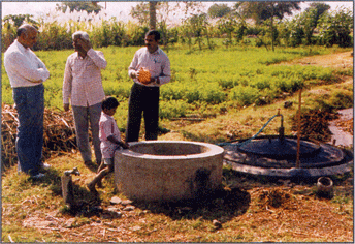
Professor M.G. Takwale of University of Pune explaining biogas enhancement using
Canadian technology
|
|

|
|
MSSO Success Stories on a Video
|
|
Success stories associated with MSSO projects are available for viewing to any interested
persons on the following videos, Three Faces of Tomorrow, Gautam's Mother and Dai: A Tribal
Midwife. Persons donating $200 or more can request a complimentary copy. Others too can receive a copy
by paying $15 per video for duplicating, handling and mailing expenses. Address and other details are given at
the end of this column.
|
|

|
|
|
|
Donations to MSSO are eligible for tax credit
(charity registration No. 10765 4410 RR 0001).
You may send your donations and/or requests
for MSSO videos to:
|
|

|
|
|
Maharashtra Seva Samiti Organization
4 Strathbury Circle SW
Calgary, Alberta
Canada T3H 1P7
Phone (403) 288-0048 Fax (403) 547-5471
|
|

|
|
|
|
|
|
|